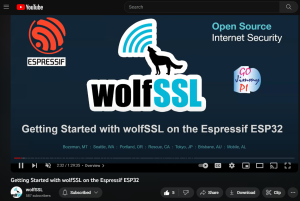RECENT BLOG NEWS
wolfBoot: support for post-quantum secure-boot with LMS/HSS signatures
Do you have a post-quantum secure-boot requirement from the looming CNSA 2.0 timeline? The timeline has stated that post-quantum signature schemes should be used exclusively by 2030, and adoption should begin immediately. To this end, a few months ago we hinted that plans were underway for post-quantum wolfBoot support, and just recently we added post-quantum LMS/HSS signatures to wolfCrypt.
Building on this, we are excited to announce we have added support for LMS/HSS post-quantum signatures to wolfBoot. LMS wolfBoot support includes keygen, signing, verifying, and importing public keys generated from e.g. an HSM. In fact, to demonstrate HSM interoperability, we recently tested an LMS firmware signature verification integration with Crypto4A’s QxEdge HSM, and showed a live demo at ICMC 2023! If you’re curious, you can read more about our support in our recently added wolfBoot PQ docs, and LMS example config. It describes the LMS/HSS parameters we support from RFC 8554, and the performance tuning and space/time tradeoffs they enable.
LMS/HSS is an example of a post-quantum stateful hash-based signature (HBS) scheme. The security of these signature schemes is based simply on their underlying hash functions and Merkle trees, and does not rely on the assumed mathematical hardness of, for example, prime factorization. This feature gives stateful HBS schemes time tested, tried and true post-quantum security, which is why they have been recommended by NIST SP 800-208 and the NSA’s CNSA 2.0 suite.
An astute reader might notice that both LMS/HSS and XMSS/XMSS^MT were recommended in NIST SP 800-208 and the NSA’s CNSA 2.0 suite. Should we add XMSS/XMSS^MT to wolfBoot as well? Let us know what you think.
If you have questions about any of the above, please contact us at facts@wolfSSL.com or call us at +1 425 245 8247.
Download wolfSSL Now
New Espressif Managed Components for MQTT and SSH
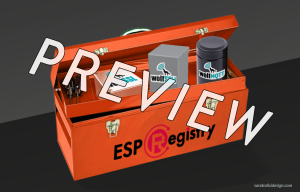
In our ongoing quest to bring the power and capabilities of wolfSSL products to all Espressif ESP32 developers, we are proud to announce two new upcoming Managed Components in the ESP Registry: wolfMQTT and wolfSSH.
Earlier this year we announced the core wolfSSL availability on the Managed Component Registry. Having wolfSSL as a Managed Component lets you get started in just a few minutes.
We know that many of you are excited to get started as soon as possible. To meet this demand we are announcing the availability of the experimental staging site for wolfSSL components:
https://components-staging.espressif.com/components?q=namespace%3Agojimmypi+wolfssl
First up is wolfMQTT. Getting started with wolfMQTT is easier than ever. Now you can get an example running in about 3 minutes. In fact, in this YouTube video [gojimmypi] demonstrates how with only a few commands in the ESP-IDF, you can get the AWS IoT MQTT example working on your own ESP32:
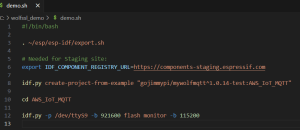
Here are the steps shown in the video:
#!/bin/bash . ~/esp/esp-idf/export.sh # Needed for Staging site: export IDF_COMPONENT_REGISTRY_URL=https://components-staging.espressif.com idf.py create-project-from-example "gojimmypi/mywolfmqtt^1.0.14-test:AWS_IoT_MQTT" cd AWS_IoT_MQTT idf.py -p /dev/ttyS9 -b 921600 flash monitor -b 115200
Note that this is using the components-staging site, and as such the IDF_COMPONENT_REGISTRY_URL setting is very important. Clear the value when using the production components link.
As you can see, for this example, only one command is needed to create the AWS IoT example application:
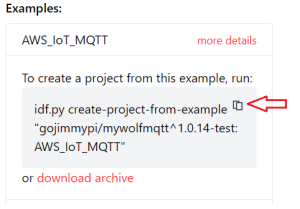
If you already have an existing project, that too is just a single command:
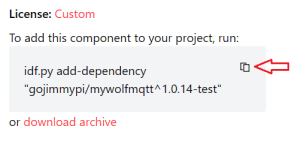
Stay tuned for the wolfSSH component to also be added. Soon these will all be available on the production ESP Registry site:
https://components.espressif.com/components?q=wolfssl
Be sure to watch the recording from the recent webinar:
Getting Started with wolfSSL on the Espressif ESP32.
See also some of the recent ESP32 blogs such as the RISC-V ESP32-C3, running Linux on the ESP32-S3 and others.
There’s also support for wolfSSL on Espressif and more Espressif resources.
Do you have any questions related to using wolfSSL in your next project? Contact us at facts@wolfSSL.com or call us at +1 425 245 8247 to learn more.
Download wolfSSL Now
wolfCrypt in TrustZone-M
Using wolfBoot as PKCS#11 secure supervisor
Today, we’re introducing an exciting feature from wolfBoot that makes use of TrustZone-M technology to enhance safe and monitored access to cryptographic operations. By exposing a complete set of standard cryptographic APIs to the application, wolfBoot provides controlled access to the wolfCrypt crypto engine running in the secure domain.
TrustZone-M and domain separation
TrustZone-M essentially creates a secure memory and IO domain within your microcontroller , where system supervision software can execute and provide controlled access to resources to its non-secure counterpart. The secure domain in TrustZone-M is similar to a controlled-access area where only trusted software can be executed. Software running in this domain is usually responsible for enforcing the separation of access permissions for all memory areas and peripherals. It may then optionally assume the role of a passive supervisor by providing special cross-domain API functions (non-secure callables), for a supervised and controlled access to specific functionality otherwise only available in the secure world. This hardware assisted feature is available on most microcontrollers in the ARMv8-M family.
Built-in, hardware assisted security module
Combining this feature with a cryptography engine running in secure mode is an ideal way to create a hardware-assisted separation for secrets and private keys from the application software. It is like having an advanced HSM that can perform crypto operations and store secrets in a security vault, where sensitive information is kept protected. This feature ensures that even if the rest of the system is compromised, the critical information stored in the vault remains secure based on hardware-enforced techniques.
Bootloader supervision
To ensure a trusted boot sequence, the requisite place to set up TrustZone-M, define the separation between the domains, and start the non-secure code execution is, of course, the bootloader. Older versions of wolfBoot were already capable of providing this type of isolation between the two domains, by using a tightly tailored wolfCrypt to verify the authenticity of the application code before staging into non-secure execution mode. We decided to further explore the potential of this integration by adding a fully-equipped wolfCrypt library to wolfBoot, running as a bootloader in the secure domain, and providing a standard way to access cryptographic functions and secure vault to the non-secure application.
The wolfCrypt library is embedded in the bootloader code, and can be used by both the applications/OS, through non-secure callable functions, as well as by wolfBoot itself for its everyday tasks of firmware authentication and integrity verification for securing the boot process.
Resources separation
The first important task to fulfill when preparing a system with TrustZone-M to run non-secure software is to set up and associate each memory segment and peripheral to either domain.
wolfBoot provides configuration options to delimit the areas in the internal flash memory of the microcontroller and separate its own non-volatile memory space from the one dedicated to running the application and receiving the updates in non-secure domain. The example configuration shown in the picture below demonstrates a possible way to divide the internal flash space. The initialization routines in wolfBoot ensure that such a segmentation is enforced through the TrustZone manager embedded in the chip. This configuration implies that the secure and non-secure flash space are logically mapped to different memory locations. A special section is reserved for non-secure callable objects exporting the API for applications to call exposed API functions from the secure domain.
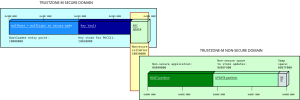
Example flash memory segmentation in an embedded system using wolfBoot as TrustZone-M supervisor
RAM can also be separated by the global trustzone controller (GTZC) in the MCU. This is also enforced at runtime by the microcontroller once the zones have been set up by wolfBoot. The picture below shows an example separation between secure and non-secure RAM sections on a STM32L552 microcontroller, offering a total of 256KB of SRAM in two separate but contiguous banks. In this configuration, half of the total SRAM is dedicated to cryptographic and vault operations in the secure domain. Also in this case, once the GTZC is configured, the RAM is mapped into two separate virtual addresses, starting at 0x3000 0000 and 0x2000 0000 for secure and non-secure domain access, respectively.
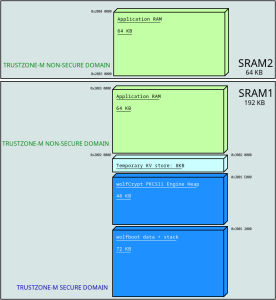
Example segmentation of RAM in an embedded system using wolfBoot as TrustZone-M supervisor
PKCS#11
What has been described so far is the infrastructure that wolfBoot is capable of supporting when running on microcontrollers supporting TrustZone-M. All we need at this point is a valid API to access the cryptographic resources offered by wolfBoot running as a TrustZone-M supervisor.
Introduced by RSA laboratories in 2004, PKCS#11 sets the path for vendor-neutral cryptographic token interface (CTI). The standard consists of a well-defined and widely accepted API for the interaction between software and hardware components accessing cryptographic functionality. The use of PKCS#11 for interactions among components in a security infrastructure simplifies the development process, as engineers can rely on standardized interfaces, ultimately reducing development time and risk.
wolfSSL products already support both endpoints for PKCS#11 interoperability. wolfCrypt can be compiled on any platform with built-in support to access a PKCS#11 engine, using the compile time flag –enable-pkcs11, or the equivalent preprocessor definition HAVE_PKCS11. The other side of the communication is provided via a separate library, wolfPKCS11. This module provides the implementation of the API using wolfCrypt as its crypto engine.
When wolfBoot is installed as TrustZone-M secure supervisor, it integrates wolfPKCS11 in its secure domain executable code, which can be accessed by any application in the non-secure domain by calling the corresponding NSC wrappers.
Securing the embedded system architecture
Thanks to the separation between the domains and the integration of a PKCS#11 engine in the secure world, applications can not directly access sensitive cryptographic information such as private keys any more, and rely on the crypto engine under the hood to use these keys when needed. For example, a TLS connection may require the endpoint running on the microcontroller to authenticate itself using a public key mechanism. The private key to generate the signature can be pre-provisioned in the secure vault and used by the TLS to confirm the identity of its local endpoint. Applications already using wolfCrypt APIs to secure data at rest don’t need any adaptations to fit in this new model, because wolfCrypt calls will be translated internally through the wolfCrypt PKCS#11 connector in the non-secure area before calling the actual algorithm implementation in the secure domain, through the NSC API. Finally, any third party application or RTOS integrating a generic PKCS#11 connector can be linked to the NSC API layer and start using the secure, supervised crypto engine right away.
By default all the cryptography functions are implemented in software by wolfCrypt. However, wolfCrypt is very versatile and can make use of hardware security modules or external secure components. This makes this design extendable when more hardware components are in the picture. Compliant usage of some of the functions in wolfCrypt requires a good quality entropy source, which is why we also introduced a secure-world driver for the TRNG of the microcontroller to feed wolfCrypt PRNGs.
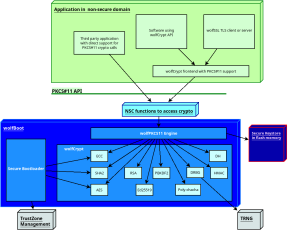
Software architecture of an embedded system using wolfBoot as TrustZone-M supervisor. Applications access wolfCrypt in secure world through the PKCS#11 NSC interface
Common use cases
There may be several reasons for a system architect to consider the adoption of wolfBoot as TrustZone-M supervisor in their projects. Some projects rely on two different layers of distribution for the software that eventually runs on target. The owner of the system, who controls the execution of secure and non-secure software on board, may decide to export a SDK to allow customization of the applications. Applications running in the non-secure domain can be mistrusted and sandboxed thanks to the flexibility of the wolfBoot interface to exclude memory sections and peripherals from the non-secure world visibility. In other cases, designers may just be searching for a stable, certified, rock-solid security engine for diverse applications, to facilitate monitoring, updating and managing vulnerabilities through a centralized point. Other scenarios may be simply looking for strong separation of key management, enforced provisioning and avoiding direct interaction between non-secure software and sensitive information, achieved thanks to the policies in place in PKCS#11 for accessing the same tokens with different capabilities and permission masks.
Example on Cortex-M33
As usual, wolfBoot is distributed with example applications to demonstrate the features through real-life porting for evaluation boards for the relevant CPU or microcontrollers in play. For this development, we focused on the STM32L552-Nucleo (Nucleo-L552ZE-Q) board, where all the features needed are accurately documented, which resulted in a smooth integration. A command line tool provided by STMicroelectronics allows users to check and modify the non-volatile registers containing the options for activating and using the TrustZone feature at hardware level. Once the option bytes are correctly configured on the board, wolfBoot can be built using the options WOLFCRYPT_TZ=1 and WOLFCRYPT_TZ_PKCS11=1 to enable wolfCrypt in TrustZone-M with its PKCS#11 interface. The test application that runs in this case initializes a token by creating a new ECC keypair and storing it in the vault. The application then uses the keypair to sign and verify a payload, checking the functionality through the validation of the signature obtained. The file docs/STM32-TZ.md included in wolfBoot provides detailed information on how to build and run the example on the target.
Further research
At wolfSSL we are committed to implement the best solutions for securing your embedded systems. The new wolfBoot feature introduced here is already being expanded to support more hardware platforms, also across different architectures providing hardware-assisted trusted execution environments. Cryptographic APIs between isolated domains can be customized and extended to integrate different interaction models. Moreover, we are looking for the best strategies to extend the wolfCrypt in trustZone-M support with post-quantum cryptography algorithms available in wolfCrypt.
Resources
wolfBoot is available in source code format. The features described in this post will be included in the upcoming version distributed through our download page (https://www.wolfssl.com/download/), and they are already available in the upstream version on our github repository (https://github.com/wolfssl/wolfboot).
If you want to receive more information on wolfBoot running in TrustZone, or if you want to chat with us about secure boot and trusted execution on embedded systems, please contact us at facts@wolfSSL.com or call us at +1 425 245 8247.
Download wolfSSL Now
Faster No Assembly ChaCha20
At wolfSSL, we always try to get you the best results possible. Most of the time the best way to achieve this is to use assembly optimization. Unfortunately dedicated assembly tuning is targeted and time consuming so it is not always available for your platform. But there are still many ways to squeeze performance out of algorithms with just C. We have achieved up to a 60% speedup in ChaCha20 without using assembly! This was accomplished by performing the exclusive or (XOR) operation on the largest possible word supported by the system. The optimization was merged in https://github.com/wolfSSL/wolfssl/pull/6203 and first available in wolfSSL 5.6.2.
The benchmark was performed on a x86_64 machine with an AMD Ryzen 5 2600 processor. wolfSSL was configured without assembly optimization with ./configure.
These are the results without this optimization:
$ ./wolfcrypt/benchmark/benchmark -chacha20 ------------------------------------------------------------------------------ wolfSSL version 5.5.4 ------------------------------------------------------------------------------ wolfCrypt Benchmark (block bytes 1048576, min 1.0 sec each) CHACHA 294 MB took 1.016 seconds, 288.985 MB/s Cycles per byte = 11.77 Benchmark complete $ ./wolfcrypt/benchmark/benchmark -chacha20 ------------------------------------------------------------------------------ wolfSSL version 5.5.4 ------------------------------------------------------------------------------ wolfCrypt Benchmark (block bytes 1048576, min 1.0 sec each) CHACHA 278 MB took 1.017 seconds, 273.204 MB/s Cycles per byte = 12.45 Benchmark complete $ ./wolfcrypt/benchmark/benchmark -chacha20 ------------------------------------------------------------------------------ wolfSSL version 5.5.4 ------------------------------------------------------------------------------ wolfCrypt Benchmark (block bytes 1048576, min 1.0 sec each) CHACHA 299 MB took 1.006 seconds, 297.137 MB/s Cycles per byte = 11.44 Benchmark complete
These are the results with this optimization:
$ ./wolfcrypt/benchmark/benchmark -chacha20 ------------------------------------------------------------------------------ wolfSSL version 5.5.4 ------------------------------------------------------------------------------ wolfCrypt Benchmark (block bytes 1048576, min 1.0 sec each) CHACHA 451 MB took 1.010 seconds, 446.210 MB/s Cycles per byte = 7.62 Benchmark complete $ ./wolfcrypt/benchmark/benchmark -chacha20 ------------------------------------------------------------------------------ wolfSSL version 5.5.4 ------------------------------------------------------------------------------ wolfCrypt Benchmark (block bytes 1048576, min 1.0 sec each) CHACHA 472 MB took 1.003 seconds, 470.584 MB/s Cycles per byte = 7.23 Benchmark complete $ ./wolfcrypt/benchmark/benchmark -chacha20 ------------------------------------------------------------------------------ wolfSSL version 5.5.4 ------------------------------------------------------------------------------ wolfCrypt Benchmark (block bytes 1048576, min 1.0 sec each) CHACHA 472 MB took 1.004 seconds, 470.026 MB/s Cycles per byte = 7.23 Benchmark complete
If you have questions about the performance of the wolfSSL embedded TLS library, please contact us at facts@wolfSSL.com or call us at +1 425 245 8247.
Download wolfSSL Now
Live Webinar: All the Cool Things We’ve Added This Year
Join us for an exclusive webinar on the exciting new additions of 2023, presented by wolfSSL Senior Software Engineer, Eric, on September 28th at 9 am PT. Eric will showcase the latest wolfSSL innovations of 2023! Let’s explore the exciting innovations that have been created by wolfSSL engineers this year and discover products and support that offer the best solutions for your projects.
Watch the webinar here: All the Cool Things We’ve Added This year
Sneak peek of the newly added cool products:
- SM Ciphers compliant with Chinese regulations
- Ada/SPARK binding
- wolfSSH ported over to Windows
- And much more!
This is your opportunity to uncover the advantages of using wolfSSL.
As always, our webinars will include Q&A sessions throughout the webinar. If you have questions about any of the above, please contact us at facts@wolfSSL.com, or call us at +1 425 245 8247
Download wolfSSL
wolfSSL Support for Renesas RZ/N2L
wolfSSL is delighted to announce that we have added support for the Renesas RZ/N2L. Renesas RZ/N2L uses a high-performance Arm Cortex-R52 core to easily add network functionality to industrial equipment and machines. The RZ/N2L is supported by an open and flexible ecosystem concept – the Flexible Software Package (FSP), built on FreeRTOS – and is expandable to use other RTOS and middleware.
As part of wolfSSL’s port to support the Renesas RZ/N2L board we have added example TLS client and server applications which demonstrate wolfSSL usage. These examples are compiled with e2Studio and run on the target board. The example applications for Renesas RZ/N2L with Renesas IDE e2studio project files are provided in the wolfSSL package, inside the “IDE/Renesas/e2studio/RZN2L” directory. A detailed instruction manual is also included to help you easily get started with wolfSSL on the platform.
These sample applications also leverage the Renesas Secure IP (RSIP), which enables cryptographic hardware acceleration. Currently wolfSSL supports the following Renesas RSIP crypto acceleration algorithms:
- SHA1/SHA256/SHA384/SHA512
- AES-CBC/AES-GCM
- RSA
Limitations:
The current version of the Renesas RSIP driver does not yet include API’s for TLS-related functionality. Therefore, wolfSSL’s usage of RSIP currently only uses hash and random generation while used inside TLS connections.
If interested in using wolfSSL on the RZ/N2L, or if you have questions about any of the above, please contact us at facts@wolfSSL.com or call us at +1 425 245 8247.
Download wolfSSL
eXtremeDB introduces support for wolfSSL
We are extremely excited to announce that McObject, a world leader in embedded and real-time database systems, has chosen wolfSSL as the TLS provider for their eXtremeDB family of database products.
About eXtremeDB
eXtremeDB is a high-performance, low-latency, ACID-compliant embedded database management system with support for both in-memory and persistent storage capability. Exceptionally fast, with unparalleled flexibility, eXtremeDB is used in virtually all embedded systems markets, from consumer electronics to network infrastructure devices to aerospace and defense systems.
In 2021, McObject released eXtremeDB/rt, the first-ever commercially supported deterministic database system suitable for use in hard real-time embedded systems. As an ACID-compliant DBMS, eXtremeDB/rt guarantees internal consistency, but with real-time features also guarantees external consistency when transactions complete within their deadlines. eXtremeDB/rt is designed for use in critical sensor data fusion systems such as avionics and aircraft navigation, driver assistance, medical equipment, power generation and distribution infrastructure, and any other high-reliability system that requires data management.
Why WolfSSL?
The eXtremeDB embedded database system powers mission critical systems that demand “five-nines” reliability (99.999% up-time), thus security and performance is an absolute necessity. When it came to choosing a TLS provider, McObject needed a library that it was confident would satisfy the stringent guarantees it provides to its customers. wolfSSL emerged as the clear choice for several reasons:
Size, Performance, and Flexibility
In the world of embedded systems, resource utilization is critical. wolfSSL can be configured to have an exceptionally small footprint, making it ideal for systems with constrained resources. It also offers the most customizability on the market, allowing users to tune it for highly specific optimization goals such as code size, stack usage, maximum performance, power consumption, and more.
Certification
Compliance is a non-negotiable requirement in secure systems, and eXtremeDB is no exception. wolfCrypt has FIPS 140-2 Certificates #3389 and #2425 and has a certificate for FIPS 140-3 on the way. wolfCrypt has also been DO-178C DAL-A certified for avionics.
Portability
eXtremeDB/rt is available and tightly integrated with all major commercial RTOS including those that are certified to airborne safety standards (DO-178). Therefore, it could not choose a TLS library that had any architectural or platform restrictions. wolfSSL is engineered for maximum portability, supporting virtually every hardware platform and operating system and, like eXtremeDB, can even run on bare-metal, making it the perfect match for eXtremeDB’s diverse use-cases.
The Best-Tested Cryptography Library
eXtremeDB is a DBMS that serves customers who demand 99.999% uptime, designed to power systems that cannot afford to fail. wolfSSL boasts an extensive testing regime, with continuous and rigorous evaluations to ensure the most secure, robust, and up-to-date cryptography solutions, making it a natural choice to satisfy eXtremeDB’s uncompromising customer requirements. Our claim as the best-tested cryptography library in the world is backed by numerous third party audits and our transparent software development process.
Getting Started with eXtremeDB
To get started with eXtremeDB, simply download the latest evaluation release, and then follow the instructions in the documentation to install the package and run the SDK samples. You can contact McObject at info@mcobject.com for more information or support.
By leveraging wolfSSL’s best-in-class TLS capabilities, eXtremeDB can now offer an additional layer of security without compromising on performance. This integration strengthens eXtremeDB’s position as a secure, fast, and reliable database solution for embedded systems and mission-critical real-time applications. We’re thrilled to partner with McObject and look forward to contributing to the ongoing success and security of eXtremeDB products.
For more information on how wolfSSL can enhance your security solutions, feel free to reach out to us at facts@wolfSSL.com, or call us at +1 425 245 8247 with any questions, comments, or suggestions.
Download wolfSSL
Live Webinar: How to Use wolfSSH on Windows
Join us for an informative webinar, wolfSSH on Windows, presented by wolfSSL Software Developer Jacob on September 21st. He will dive into the latest updates on wolfSSH tailored for the Windows environments.
Watch the webinar here: How to Use wolfSSH on Windows
wolfSSH has been ported to Windows, allowing it to operate as a service and host incoming SSH, SFTP and SCP connections. The power of wolfSSH extends further with the advantages of post-quantum support, along with the cryptographic library wolfCrypt, and it’s FIPS certified!
Don’t miss out on this opportunity to discover the benefits of using wolfSSH. This is your chance to gain knowledge about wolfSSH and enhance your technical skills.
As always, our webinars will include Q&A sessions throughout. If you have questions about any of the above, please contact us at facts@wolfSSL.com, or call us at +1 425 245 8247.
Download wolfSSL
wolfSSL DTLS1.3 ESP32 Examples Now Available
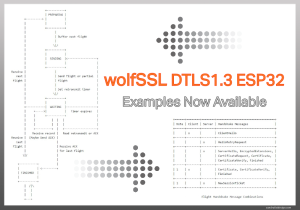
Last year, wolfSSL announced support for the new RFC 9147 DTLS1.3 Standard. We now have DTLS13 client and server examples available for the Espressif ESP32 series. These projects can optionally be used in conjunction with the command-line client and server examples.
There are a variety of DTLS (both 1.2 and 1.3) examples in the wolfssl-examples/dtls.
If you intend to use Wireshark to inspect packets and verify that your application is using the newest DTLS 1.3, as of September 2023 this feature has not yet been added. See WireShark issue #18071. In the meantime you can check the cipher suite attribute in the Wireshark packet inspection and confirm it is one of the valid TLS 1.3 cipher suites. See RFC 8446 Page 133:
+------------------------------+-------------+
| Description | Value |
+------------------------------+-------------+
| TLS_AES_128_GCM_SHA256 | {0x13,0x01} |
| | |
| TLS_AES_256_GCM_SHA384 | {0x13,0x02} |
| | |
| TLS_CHACHA20_POLY1305_SHA256 | {0x13,0x03} |
| | |
| TLS_AES_128_CCM_SHA256 | {0x13,0x04} |
| | |
| TLS_AES_128_CCM_8_SHA256 | {0x13,0x05} |
+------------------------------+-------------+
Just getting started with wolfSSL on the ESP32? Check out the recorded webinar on youtube
See also some of the recent ESP32 blogs such as the RISC-V ESP32-C3, running Linux on the ESP32-S3 and others.
There’s also support for wolfSSL on Espressif and more Espressif resources.
Do you have any questions related to using wolfSSL in your next project? Contact us at facts@wolfSSL.com or call us at +1 425 245 8247 to learn more.
Download wolfSSL
wolfCLU supports new x509 options
We are constantly enhancing wolfCLU, a command line utility for manipulating certificates. Recently we added some new x509 options. These additions, -req, -extfile, -extensions, -signkey and -* enhance the x509 functionality. Having these options added to wolfCLU helps with generatingself-signed x509 certificates when using the x509 command.
- [-req] Users can generate a certificate signing request (CSR) directly from the command line.
- [-extfile] Users can specify a file containing certificate extension configuration.
- [-extensions] Users can define certificate extensions directly in the command line.[-signkey] Users can provide an existing private key to sign the certificate being generated.
- [-*] Users can select any supported digest for signing. Currently sha1, sha256, sha384 and sha512 are available.
The following example demonstrates how to use these new options to update a self signed x509 certificate.
wolfssl x509 -req -in client-cert.csr -extfile wolfssl.cnf -extensions
uri -signkey client-key.pem -out client-uri-cert.pem
These new options are part of our ongoing commitment to provide a feature-rich and user-friendly experience with wolfCLU’s x509 command.
If you have any feedback, questions, or require support, please don’t hesitate to reach out to us at facts@wolfSSL.com. or call us at +1 425 245 8247.
Download wolfSSL
Weekly updates
Archives
- April 2025 (20)
- March 2025 (22)
- February 2025 (21)
- January 2025 (23)
- December 2024 (22)
- November 2024 (29)
- October 2024 (18)
- September 2024 (21)
- August 2024 (24)
- July 2024 (27)
- June 2024 (22)
- May 2024 (28)
- April 2024 (29)
- March 2024 (21)
- February 2024 (18)
- January 2024 (21)
- December 2023 (20)
- November 2023 (20)
- October 2023 (23)
- September 2023 (17)
- August 2023 (25)
- July 2023 (39)
- June 2023 (13)
- May 2023 (11)
- April 2023 (6)
- March 2023 (23)
- February 2023 (7)
- January 2023 (7)
- December 2022 (15)
- November 2022 (11)
- October 2022 (8)
- September 2022 (7)
- August 2022 (12)
- July 2022 (7)
- June 2022 (14)
- May 2022 (10)
- April 2022 (11)
- March 2022 (12)
- February 2022 (22)
- January 2022 (12)
- December 2021 (13)
- November 2021 (27)
- October 2021 (11)
- September 2021 (14)
- August 2021 (10)
- July 2021 (16)
- June 2021 (13)
- May 2021 (9)
- April 2021 (13)
- March 2021 (24)
- February 2021 (22)
- January 2021 (18)
- December 2020 (19)
- November 2020 (11)
- October 2020 (3)
- September 2020 (20)
- August 2020 (11)
- July 2020 (7)
- June 2020 (14)
- May 2020 (13)
- April 2020 (14)
- March 2020 (4)
- February 2020 (21)
- January 2020 (18)
- December 2019 (7)
- November 2019 (16)
- October 2019 (14)
- September 2019 (18)
- August 2019 (16)
- July 2019 (8)
- June 2019 (9)
- May 2019 (28)
- April 2019 (27)
- March 2019 (15)
- February 2019 (10)
- January 2019 (16)
- December 2018 (24)
- November 2018 (9)
- October 2018 (15)
- September 2018 (15)
- August 2018 (5)
- July 2018 (15)
- June 2018 (29)
- May 2018 (12)
- April 2018 (6)
- March 2018 (18)
- February 2018 (6)
- January 2018 (11)
- December 2017 (5)
- November 2017 (12)
- October 2017 (5)
- September 2017 (7)
- August 2017 (6)
- July 2017 (11)
- June 2017 (7)
- May 2017 (9)
- April 2017 (5)
- March 2017 (6)
- January 2017 (8)
- December 2016 (2)
- November 2016 (1)
- October 2016 (15)
- September 2016 (6)
- August 2016 (5)
- July 2016 (4)
- June 2016 (9)
- May 2016 (4)
- April 2016 (4)
- March 2016 (4)
- February 2016 (9)
- January 2016 (6)
- December 2015 (4)
- November 2015 (6)
- October 2015 (5)
- September 2015 (5)
- August 2015 (8)
- July 2015 (7)
- June 2015 (9)
- May 2015 (1)
- April 2015 (4)
- March 2015 (12)
- January 2015 (4)
- December 2014 (6)
- November 2014 (3)
- October 2014 (1)
- September 2014 (11)
- August 2014 (5)
- July 2014 (9)
- June 2014 (10)
- May 2014 (5)
- April 2014 (9)
- February 2014 (3)
- January 2014 (5)
- December 2013 (7)
- November 2013 (4)
- October 2013 (7)
- September 2013 (3)
- August 2013 (9)
- July 2013 (7)
- June 2013 (4)
- May 2013 (7)
- April 2013 (4)
- March 2013 (2)
- February 2013 (3)
- January 2013 (8)
- December 2012 (12)
- November 2012 (5)
- October 2012 (7)
- September 2012 (3)
- August 2012 (6)
- July 2012 (4)
- June 2012 (3)
- May 2012 (4)
- April 2012 (6)
- March 2012 (2)
- February 2012 (5)
- January 2012 (7)
- December 2011 (5)
- November 2011 (7)
- October 2011 (5)
- September 2011 (6)
- August 2011 (5)
- July 2011 (2)
- June 2011 (7)
- May 2011 (11)
- April 2011 (4)
- March 2011 (12)
- February 2011 (7)
- January 2011 (11)
- December 2010 (17)
- November 2010 (12)
- October 2010 (11)
- September 2010 (9)
- August 2010 (20)
- July 2010 (12)
- June 2010 (7)
- May 2010 (1)
- January 2010 (2)
- November 2009 (2)
- October 2009 (1)
- September 2009 (1)
- May 2009 (1)
- February 2009 (1)
- January 2009 (1)
- December 2008 (1)


